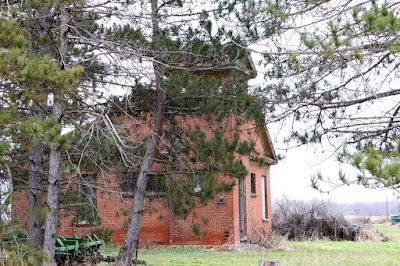When we moved into our home in Minnesota's Eighth Congressional District, Jim Oberstar represented the district in Congress. Minnesota had a long-standing reputation of being a liberal bastion with an acknowledged conservative element in the rural, farming areas. The current congressman, a Republican, has just been reelected. The district appears to be drifting toward the Right, or have the Democrats moved Left? In any case, Minnesota is a more purple state, and our Congressional District is more red than it was a quarter century ago.
 |
| do we really want all farmsteads abandoned?
Photo by J. Harrington
|
Fortunately, about the time the current occupant of the White House was inaugurated in 2017, we came across and read ‘What Do You Do if a Red State Moves to You?’ It's based in Pepin County Wisconsin, just across the Mississippi river from Minnesota and so is close enough to home to be helpful.
But Pepin County is one of those rural areas, and the resentment isn’t just directed at the coasts. It’s local. Here, the urban elite isn’t a faceless, distant other: It’s the enclave of liberal, mostly Twin Cities newcomers who have moved here over the past few decades—not just an abstract political imposition, but an actual physical presence. It has spawned anger and bitterness, a simmering undercurrent of alienation among many people locally born and raised. It has made “Democrat” mean something it didn’t mean a generation ago.
We have become more and more engaged in a neoliberal, global economy of commodities and transactions. Much of rural US was based on relationships, not transactions. What's left of rural US is still heavily dependent on relationships but is slowly being driven out of business by the economies of scale and governmental support provided by and to industrial agriculture, "Big Ag." For a number of reasons, including some economic ones, we can't afford monopolistic agriculture. We need an extended period of policy that supports a "Get Big? Get Out!" theme. As told in the Red State piece:
“When I was in the city, you could choose to ignore people,” Myklebust said. “Here, the person with whom you have strenuous political differences is also the person who drives the ambulance or the fire truck or teaches your kids at school. You have to engage with people with whom you disagree. We have to figure that out—if America is going to survive as a democracy. It sounds dramatic to say, but that’s really where we are.”
We've visited Pepin County several times. It's beautiful country. We're not sure if we actually live someplace that's really "Trump Country," although we know it's a possibility. What we are beginning to think is that politics, as it's been practiced for too long, has too many of US in each other's faces. We've become overly reliant on what's legal more than what's right, especially when what's right might well mean minding our own business.
Recently we've read several essays noting the inaccuracies and errors in Garrett Hardin's "Tragedy of the Commons." In particular, we appreciate the work of Nobel Laureate Elinor Ostrom as summarized by the following:
... groups are capable of avoiding the tragedy of the commons without requiring top-down regulation, at least if certain conditions are met (Ostrom 1990, 2010). She summarized the conditions in the form of eight core design principles: 1) Clearly defined boundaries; 2) Proportional equivalence between benefits and costs; 3) Collective choice arrangements; 4) Monitoring; 5) Graduated sanctions; 6) Fast and fair conflict resolution; 7) Local autonomy; 8) Appropriate relations with other tiers of rule-making authority (polycentric governance). This work was so groundbreaking that Ostrom was awarded the Nobel Prize in economics in 2009.
It seems one of the major questions we're facing these days is how do we inject Ostrom's 8 principles into the political discourse necessary for US to once again become "We, the people..."
I Commit
I commit to vote becauseI'm pretty sure I grabwhatever I need from the worldand place it in my mindwhich is getting incrementallylike the commonsundeniably more toxic and sadyes I too walk aroundconsidering my intractable problemscomplaining it's too latefor more sonataseverything is already too beautifulmusic and anger won't save usyet I commit to talkingearnestly with Sarahabout the school boardit will be night and we will be sittingshoulder to shoulderat the old table we loveeach holding a pencillike grade school children left alone at lastthen in the morningbefore our son wakesI commit to holdingthis tiny bit of quicksilver(quick in the sense of livingin its very molecular natureit wants to usefully combine with yours)in my palm and to walkingup to the blue mailboxI pass most morningsin that familiar silenceunder those nameless little treeswhen all things that surround me wait
********************************************
Thanks for visiting. Come again when you can.
Please be kind to each other while you can.
No comments:
Post a Comment